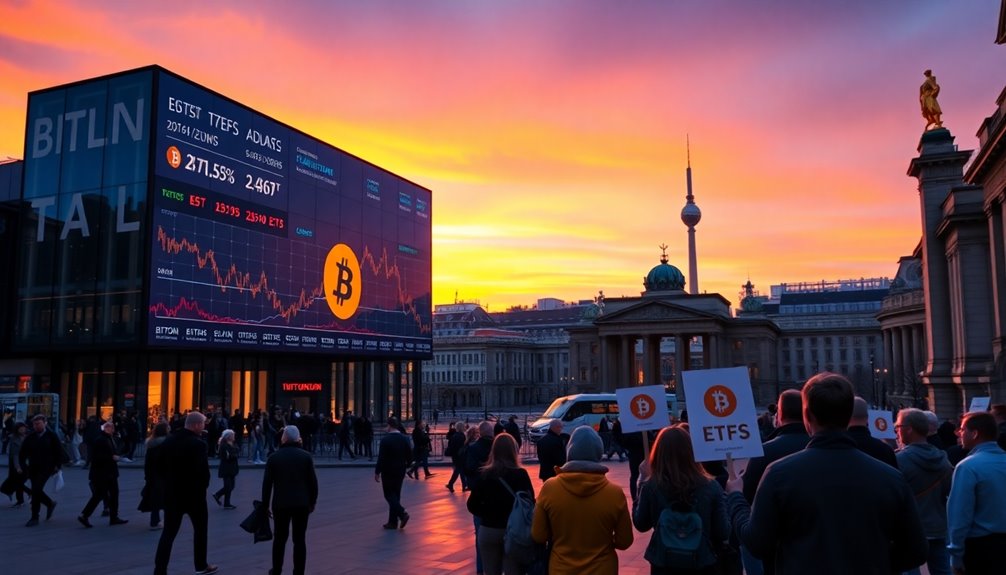Germany's strategy to recognize Bitcoin as legal tender is set to significantly transform digital finance. By fostering a supportive regulatory environment, they're positioning themselves as leaders in cryptocurrency adoption. This acknowledgment could pave the way for enhanced investor confidence and broader acceptance of Bitcoin in traditional finance. With plans for issuing bonds on blockchain and a focus on compliance with regulations, they're creating a stable ecosystem for digital assets. This shift not only benefits Germany but could also influence global trends in cryptocurrency. Curious about the full implications? There's much more to uncover about this evolving landscape.
Key Takeaways
- Germany's recognition of Bitcoin as legal tender could set a global precedent, influencing other nations' digital currency policies.
- A supportive regulatory environment, facilitated by formal committees, may attract more investments in digital finance.
- The upcoming MiCA framework will provide structured regulations for cryptocurrency exchanges, enhancing investor confidence and market stability.
- Institutional interest in Bitcoin ETFs reflects a shift towards mainstream acceptance of cryptocurrencies as legitimate assets, boosting the digital finance ecosystem.
- Germany's proactive approach to blockchain innovations aims to position it as a leader in the evolving digital finance landscape.
Bitcoin Fundamentals Explained

Bitcoin is a revolutionary digital currency that operates on a decentralized network, allowing for secure and transparent transactions. It uses the SHA-256 encryption algorithm to ensure data integrity within its blockchain, where each block contains a hash of the previous one, a timestamp, and transaction data. This structure makes it nearly impossible to alter any block without changing all subsequent ones, protecting against fraud. You can audit transactions easily due to the blockchain's transparency. Mining involves solving complex cryptographic problems, and miners compete to validate transactions, ensuring network security through a proof-of-work system. As of April 2024, the current Bitcoin block reward is 3.125 BTC, which incentivizes miners' participation in maintaining the network. Ownership is managed through digital wallets, where public and private keys facilitate secure transactions, maintaining the authenticity and integrity of your Bitcoin assets.
Germany's Digital Currency Ambitions

As the world increasingly embraces digital currencies, Germany is stepping up its game with ambitious plans for integrating Bitcoin into its financial landscape.
They're considering recognizing Bitcoin as legal tender, which could set a precedent for other nations. By establishing a formal committee dedicated to Bitcoin, Germany aims to create a supportive regulatory environment that encourages innovation while ensuring privacy and security. This recognition could have global implications, influencing Bitcoin's value and adoption. Moreover, discussions around issuing bonds on the blockchain and creating a German Bitcoin reserve highlight Germany's commitment to embracing digital currency. As interest in Bitcoin grows, the country is poised to become a leader in the evolving digital finance ecosystem. Notably, Germany's recognition of Bitcoin as legal form of payment aligns with a strategic financial move towards proactive economic policies.
Mechanisms of Bitcoin Transactions

Understanding the mechanisms of Bitcoin transactions is crucial for anyone looking to navigate the world of digital currencies. Each participant uses public-private key pairs: public keys for receiving funds and private keys for authorizing spending.
When you create a transaction, it includes inputs, outputs, and amounts. Nodes in the network validate these transactions, ensuring they're legitimate before broadcasting them to miners. This process involves signing transactions with a signature script. Additionally, the transaction consists of inputs and outputs that must balance to ensure proper fund transfer. Regular monitoring of market trends is essential for timely adjustments in transaction strategies.
Transactions propagate through a peer-to-peer network using a flooding mechanism, reaching all nodes quickly. Once validated, miners group transactions into blocks, linking them with cryptographic hashes.
This blockchain structure guarantees security and immutability, making it nearly impossible to alter past transactions without consensus from the network. Understanding Bitcoin volatility can enhance risk management strategies for individuals engaging in digital finance.
Pros and Cons of Bitcoin

The world of Bitcoin offers both opportunities and challenges that potential users and investors should weigh carefully.
On the plus side, Bitcoin provides access to financial services for the unbanked, operates 24/7, and boasts lower transaction fees with faster processing times. Its advanced cryptography enhances security, making fraud less likely. Additionally, Bitcoin promotes financial inclusivity for individuals who may have been excluded from traditional banking systems. Furthermore, the rise of decentralized finance is reshaping how individuals engage with financial services.
However, Bitcoin's price can fluctuate dramatically, posing risks for investors. Regulatory uncertainty looms, with inconsistent regulations across countries and potential government crackdowns. Increased scrutiny from regulators may impact market dynamics in the future.
Users must also navigate cybersecurity threats, as irreversible transactions can lead to permanent losses. Lastly, the need for understanding complex technologies may intimidate non-tech-savvy individuals.
Balancing these pros and cons will be crucial for anyone considering entering the Bitcoin space.
Bitcoin vs. Traditional Currencies

What makes Bitcoin stand out compared to traditional currencies?
First, it operates on blockchain technology, creating a secure and transparent record of transactions. This decentralized ledger allows anyone to verify and access transaction data, eliminating the need for intermediaries. You can conduct peer-to-peer transactions directly, which cuts fees and speeds up international transfers. Additionally, 85% of merchants view crypto payments as a tool for reaching new customers, highlighting the growing interest in digital currencies. Moreover, the use of analytics in optimizing asset management can enhance the efficiency of managing Bitcoin investments.
Unlike fiat currencies, Bitcoin's supply is capped at 21 million, giving it scarcity similar to gold. However, its value fluctuates based on market demand, unlike the stable backing of government-issued money.
While traditional currencies benefit from regulatory oversight and global acceptance, Bitcoin offers a unique alternative that challenges conventional financial systems, providing you with more control over your assets.
Regulatory Compliance Hurdles

Navigating the regulatory landscape for cryptocurrency in Germany can be complex, especially with the stringent compliance requirements in place. You'll need to secure a license from BaFin to operate a cryptocurrency exchange, as the agency oversees all such activities. With the upcoming MiCA framework set to launch by summer 2024, further rules will shape how exchanges and custodial wallet providers function. You must also implement robust KYC procedures to comply with anti-money laundering regulations and monitor transactions for suspicious activities. Additionally, be mindful of tax obligations; you're required to report any crypto transactions and declare profits over €600. The legal uncertainty from missing implementing laws can add another layer of complexity to your compliance efforts. Furthermore, the 2020 law mandates licensing for all cryptocurrency exchanges, reinforcing the importance of regulatory adherence.
Emergence of Bitcoin ETFs

As Bitcoin continues to gain traction, the emergence of Bitcoin ETFs is transforming the investment landscape.
These funds make it easy for you to invest in Bitcoin through traditional brokerage accounts, eliminating the hassle of managing private keys. Regulated by financial authorities, Bitcoin ETFs offer you a level of protection and compliance that enhances your confidence in the investment. Additionally, they provide a higher level of regulatory oversight, ensuring that investor interests are safeguarded. Furthermore, the growing institutional interest in cryptocurrencies is also seen as a driving factor for the adoption of Bitcoin ETFs.
They allow you to gain exposure to Bitcoin without the need for direct purchases or storage. While they present diversification opportunities, you should also be mindful of associated fees and the potential for market volatility.
As more countries, including Germany, adopt Bitcoin ETFs, you'll likely see a growing legitimacy of Bitcoin as a mainstream asset class.
Security Measures for Bitcoin Storage

To safeguard your Bitcoin investments, implementing robust security measures for storage is crucial.
Start by ensuring all communications between your wallet and servers use TLS/SSL encryption to prevent interception. Consider employing end-to-end encryption to protect your data from intermediaries. Avoid public Wi-Fi and use VPNs for added security when accessing your wallet.
For physical threats, utilize hardware security modules and biometric authentication to secure wallet access. Enable remote wipe capabilities to erase data if your device is lost. Incorporating multi-factor authentication adds an extra layer of protection against unauthorized access.
Cold storage methods, like hardware wallets or paper wallets, keep your private keys offline, reducing exposure to online threats.
Lastly, enable two-factor authentication and keep your wallet software updated to enhance your security further.
Frequently Asked Questions
How Does Germany's Bitcoin Strategy Compare to Other Countries?
Germany's Bitcoin strategy stands out with its stringent regulatory framework, requiring exchanges to obtain licenses and comply with AML and KYC regulations.
Unlike some countries that have lax rules, Germany's proactive approach enhances investor protection and market stability.
While nations like El Salvador have adopted Bitcoin as legal tender, Germany focuses on integrating digital assets into traditional finance, fostering a secure environment for institutional adoption and innovative investment options.
What Impact Might This Strategy Have on Small Businesses?
Imagine your small business thriving in both local and international markets, while your competitors struggle with high transaction fees.
By adopting Bitcoin, you could streamline operations, reduce costs, and enhance security. This strategy not only opens new revenue streams but also offers a hedge against inflation and currency volatility.
With clear regulations in place, embracing Bitcoin could position you at the forefront of financial efficiency and innovation, ensuring your business stays competitive and resilient.
Are There Any Notable German Companies Adopting Bitcoin?
You'll find several notable German companies adopting Bitcoin.
For instance, Commerzbank is collaborating with Crypto Finance to provide trading access for corporate clients.
DZ Bank enables 700 cooperative banks to offer Bitcoin trading through the Boerse Stuttgart exchange.
Additionally, Volksbank Bayern Mitte allows customers to buy Bitcoin online and even has a Bitcoin ATM.
These initiatives showcase a growing acceptance of cryptocurrencies among traditional financial institutions in Germany.
How Will Consumers Be Educated About Bitcoin Usage?
To educate you about Bitcoin usage, various strategies will be implemented.
Financial literacy programs, workshops, and online resources will provide essential knowledge.
Regulatory bodies and banks will launch media campaigns and engage with you on social platforms to raise awareness.
You'll have access to interactive tools and expert insights, making complex concepts easier to understand.
What Are the Future Trends for Bitcoin in Germany?
Imagine trading gold coins while your neighbor's using a smartphone app to buy stocks.
That's how Bitcoin's future in Germany looks. You'll see more companies accepting it, and regulatory frameworks evolving to support Bitcoin ETFs and strategic reserves.
As investor confidence grows, you might find yourself investing more in cryptocurrencies.
With Germany's strong technical base, blockchain innovation will thrive, pushing Bitcoin into mainstream finance and reshaping how you view currency.
Conclusion
Germany's Bitcoin strategy could indeed reshape digital finance, offering a blend of innovation and regulation. While some might argue that Bitcoin's volatility undermines its reliability, consider that traditional currencies face their own fluctuations. By embracing Bitcoin and establishing clear regulations, Germany can create a stable environment that fosters growth. This approach not only enhances trust but also positions Germany as a leader in the digital currency landscape, paving the way for a more inclusive financial future.









